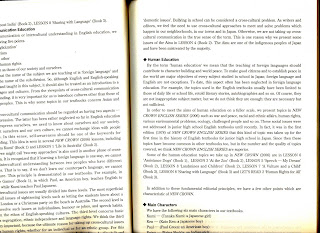So Japan recently won the coveted '
best behaved students in the world,' prize.
Let me tell you, this is nonsense. There isn't a single class in any of the
three schools I teach in, that isn't noisy. The truth of the matter is plain for all to see, noise is not indicative of learning achieved, nor of classroom discipline; yet this study used 'time taken for the class to quiet down,' as the objective measurement for this survey. I'm sure everyone can come up with a couple of reasons why this is ridiculous, so I won't bother stating them here. What I will say, however, is that roughly 75% of my classes are average/strong with regards to achievement of learning objectives - that is to say: I feel a sense of accomplishment when I walk out of those classes, I feel the students have gained something.
Being a student in England, my own sense of achievement would have been roughly 25% of lessons. This of course soared to 26% at the sixth form level, where the morons and unwilling were weeded out - leaving nothing but the rest of us.
University is dictated by your own standards and rules, so it's hard not to feel a sense of accomplishment in that kind of environment, and is the primary reason why I vehemently believe in higher education being a useful tool for anyone, regardless of intended vocation or course of study. If you can't handle it academically, then don't apply, but for everyone else - please go to university. Preferably a university outside america or England, so the tuition will be better and cheaper.
The point of all this? I don't doubt that Japan has a significant lead over the West in terms of educational aptitude (Notice how I am deliberately not saying their smarter? They're not. Much to the chagrin of Japanophiles and the department of education.) but not for their lack of noise in a classroom.
If a student is asleep in class, they are left to it. If they are noisy and disruptive, no attempt is made to settle the child down. There is
no provision for mentally disadvantaged children. Let me just reiterate - no provision for ADHD, no provision for anger issues, no provision for any of the 'mild,' mental health issues that essentially nullify the ability of the child in question, or anyone within a forty foot radius, to learn. If a child can dress itself, control his or her body physically, and doesn't require a wheelchair ramp - they're fair game for the comprehensive classroom.
England tried doing this, I was part of the generation where ultra-liberal policy (inclusion of everyone in the classroom, everyone deserves to learn nothing afterall) was misinterpreted and implemented. Primary education sucked because we had to endure this nonsense, secondary education sucked through the compulsory period, and only became tolerable when we reached the sixth-form.
Japan may have the quietest students on average (I don't believe that for a second), and it may well produce perfectly educated clones - but it is not the 'best,' system because it doesn't cater to individual needs. It doesn't cater to special needs, it doesn't cater to the most able students, it doesn't even fulfil the remit of catering to the average (in this sense, average meaning the largest demographic of students possible, in order to include everyone) because the average is skewed by those are the top and bottom. It is by no means the best.
Schools in England are set - at least in core subjects; and this simple addition means that for these subjects, everyone is treated to the education they are capable of assimilating. This
exceedingly simple process doesn't occur here, and as a result, Japanese universities receive clones, produce clones and nothing comes of it. Ever wondered why the top Japanese university doesn't even rank in the top 25 of worldwide universities, despite having the 'best,' students in the world, and being the most technologically advanced country in the world?
Then again maybe I'm misunderstanding the intention of Japan as a country. They don't care about international sport, they don't want to excel academically - perhaps striving to be average, with full body, mind and spirit, is the accepted way in Japan.
I know a lot of people will misunderstand this particular post, brought about by the wilfully misleading BBC cited article about global child 'behaviour.' Japanese students (for the most part) listen well, work hard and try their best. This rant is about the ridiculous basis for the article, and the inherent flaws in an education system whose remit is to provide an equal opportunity to learn for everyone. They've misinterpreted this statement, as has the UK, to mean everyone should be lumped in together, regardless of ability or disability. To my mind, it means that everyone should be equally able to access the information available, something that is impossible when the mentally retarded child in the class is equal parts punching the other boys, and pulling the girls hair for forty-five minutes, while screaming bloody murder. It's true, everyone in this scenario has equal access to education; but it's equal access to
no education.
























